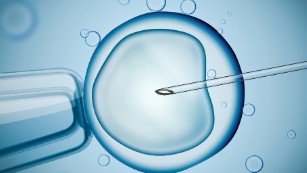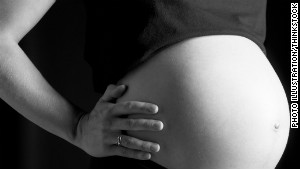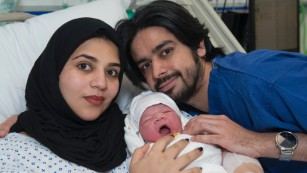 Jobs that involve heavy lifting on a regular basis could reduce a woman's fertility, particularly among overweight and obese women, a new study shows.
Jobs that involve heavy lifting on a regular basis could reduce a woman's fertility, particularly among overweight and obese women, a new study shows.
The research, published Monday in the journal Occupational and Environmental Medicine, also found that working antisocial hours (in the evenings or night) or rotating shifts, may also impact female fertility.
Though the underlying cause is not known and more research is needed to further verify the findings, the team at the Harvard T.H. Chan School of Public Health believes that women in their reproductive years may need to consider this when trying to conceive.
"Our study suggests that women who are planning pregnancy should be cognizant of the potential negative impacts that non-day shift and heavy lifting could have on their reproductive health," said Lidia Mínguez-Alarcón, a research fellow in the Department of Environmental Health and lead author of the study, in a statement.
Recent studies have shown potential associations between physically demanding jobs or shift work and reduced fertility, but this new study explored direct biomarkers for fertility in the body, such as egg numbers and hormone levels, to suggest possible mechanisms behind the change.
Reduced egg count
The team of researchers studied more than 470 women having fertility treatment and compared the physical demands and schedules of their jobs against four biomarkers -- genes or characteristics in the body -- known to be linked to their ability to reproduce, also called fecundity.
The biomarkers were numbers of antral follicles, indicative of the number of immature eggs remaining in the body; levels of follicle-stimulating hormone that regulated reproductive processes; estrogen levels; and numbers of mature eggs capable of developing into healthy embryos.
The heavier the lifting or moving of objects the women reported doing in their jobs, the lower the number of antral follicles and mature egg: Women reporting heavy lifting and moving had 8.8% fewer total eggs and 14.1% fewer mature eggs compared with women who never lifted or moved heavy objects at work.
"These occupational exposures are affecting egg production and quality," said Audrey Gaskins, an epidemiologist at the Harvard T.H. Chan School and senior author on the paper told CNN.
This reduction in mature eggs was even greater in women who were also overweight, obese or over the age of 37.
"We saw this same association in an entirely different cohort," Gaskins said of a recent study by her team that also saw a link between obesity and reduced fertility. "We speculate it could be due to a disrupted stress-response system. Obesity affects the body's ability to handle stress."
People who worked nights or rotating shifts in the new study also saw a reduction in the number of mature eggs.
No association, however, was seen between these aspects of the women's occupation and their levels of follicle-stimulating hormone or estrogen.
Theories on differences
The mechanisms explaining this link to reduced fertility are not known, but the researchers would like to explore further, as well as looking at whether this impact on fertility could be improved, reduced or avoided.
"(We want) to look at whether a woman is able to change her schedule or lifting and whether we see a change in fecundity," Gaskins said, adding that this would determine whether the effect is short- or long-term. If stopping these exposures leads to an improvement, the team can make recommendations for policies.
"It's perhaps not surprising that people under more physical stress might have poorer fertility, but the big question is, why?" Channa Jayasena, a reproductive endocrinologist at Imperial College London who was not involved in the study, told CNN.
He cited previous studies showing that women who are malnourished or do extreme amounts of exercise, putting strain on their bodies, see adverse fertility effects. "It's possible this is an extension of that," he said.
But Jayasena added that although this study was interesting and insightful, greater sample sizes than the less than 500 in this study are needed to truly account for differences such as socioeconomic status.
"I think this tells us a limited amount," he said. "You need a study in the thousands."
Gaskins highlighted that the women were probably all of fairly high socioeconomic status, given that they were able to afford fertility treatment.
Another factor not accounted for was testosterone.
"In the study, no effort was made to address confounding by testosterone levels in those women. A physically stronger woman is more likely to undertake heavy lifting but would also be implicitly less fertile," said Alastair Sutcliffe, professor of pediatrics at University College London in the UK. "The typical and consistent differential between the sexes of strength is 10% to 15%, and this (is) accounted for by testosterone. Women also produce testosterone, albeit at a lower level than men."
One possible theory for the differences of shift work is disruption to a woman's circadian rhythm. Here, the researchers and Jayasena agree.
"It's certainly a very plausible mechanism," he said. "Each part of the body has its own circadian rhythm, including the ovaries."
Shift work has been proven to have a range of negative consequences on health, including increased risk of heart disease and obesity.
"Shift work is not a biologically good way to work," said Sutcliffe. "So what does this study mean? If trying to optimize fertility, stick to the day job and leave the lifting to their partner."
Reference :http://www.cnn.com/2017/02/07/health/infertility-manual-labor-shift-work-egg-count-study/index.html
Reference :http://www.cnn.com/2017/02/07/health/infertility-manual-labor-shift-work-egg-count-study/index.html



कोई टिप्पणी नहीं:
एक टिप्पणी भेजें